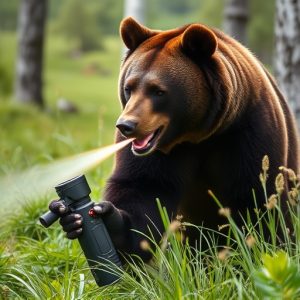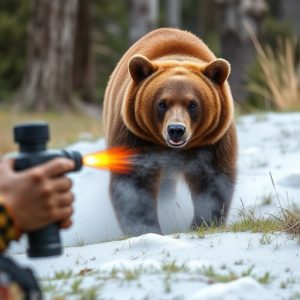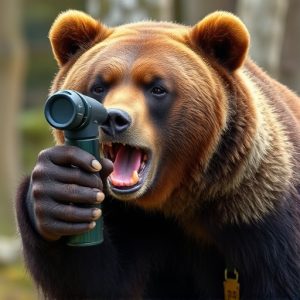Bear Repellent Spray: Essential Camping Gear – Active Ingredients & Comparisons
Understanding bear behavior is crucial for deciding when to use bear repellent spray while camping,…….
Understanding bear behavior is crucial for deciding when to use bear repellent spray while camping, especially distinguishing between its effectiveness and that of pepper spray, particularly regarding grizzlies. Bear spray, containing capsaicin from chili peppers, targets bears' sensitive eyes and respiratory systems with higher concentrations than regular pepper spray. Proper usage involves aiming at the bear's face from a safe distance. Choosing the right bear repellent spray is key for safety in areas with high bear activity, considering factors like active ingredients, concentration, and application method to deter aggressive bears effectively.
“Enhancing your camping experience and ensuring safety in bear country is essential, especially with increasing encounters. This comprehensive guide explores the necessity of bear repellent spray as a crucial camping essential. We delve into understanding bear behavior, deconstructing the active ingredients in these sprays, and comparing bear spray to pepper spray. By the end, you’ll be equipped to choose the right bear repellent for your trips, knowing exactly what works best, including whether bear spray truly reigns supreme over pepper spray.”
- Understanding Bear Behavior: When and Why Spray is Necessary
- Deconstructing Bear Spray: Active Ingredients and Their Effectiveness
- Pepper Spray vs. Bear Spray: A Comparative Analysis
- Choosing the Right Bear Repellent Spray for Your Camping Trips
Understanding Bear Behavior: When and Why Spray is Necessary
Understanding bear behavior is crucial when it comes to deciding whether and when to use bear repellent spray while camping. Bears are typically wary of humans, but they can become aggressive if they feel threatened, surprised, or if their young are nearby. Black bears, in particular, tend to avoid people, but grizzly bears have a more unpredictable nature. During certain times of the year, such as late spring and early fall when food is scarce, bears may be more inclined to forage in areas frequented by campers, increasing the likelihood of encounters.
The necessity of bear spray arises from situations where conventional deterrents like noise or quick escapes are not feasible. Unlike pepper spray designed for human self-defense, which aims to cause temporary blindness and irritation, bear repellent spray is specifically formulated to deter bears by targeting their sensitive eyes and respiratory systems. While debates persist regarding the effectiveness of bear spray compared to pepper spray—with some questioning its strength and range—many experts agree that it remains a crucial tool for bear country safety. The key lies in proper usage: holding the can upright, aiming at the bear’s face, and spraying from a safe distance.
Deconstructing Bear Spray: Active Ingredients and Their Effectiveness
Bear repellent spray is a crucial addition to any camper’s gear, but understanding its composition and effectiveness is key. Deconstructing bear spray reveals a blend of active ingredients designed to deter bears from approaching. One of the primary components, capsaicin, is derived from chili peppers and is known for its potent irritant properties. It stimulates pain receptors, creating an unpleasant sensation that prompts bears to retreat.
Comparing bear spray to pepper spray, which contains capsaicin, shows varying strengths and applications. While pepper spray is effective against humans and other animals, bear spray typically has a higher concentration of capsaicin tailored for deterring larger wildlife like bears. This specialized formula ensures that campers have the right tool to handle potential encounters with these formidable creatures in their natural habitats.
Pepper Spray vs. Bear Spray: A Comparative Analysis
When it comes to protecting yourself in bear country, understanding the differences between pepper spray and bear spray is crucial. While both serve as deterrents against aggressive bears, their composition and effectiveness vary significantly. Pepper spray, a common self-defense tool, uses capsaicin, the same compound that makes chili peppers spicy, to cause temporary blindness, coughing, and difficulty breathing. Its primary purpose is to disable an attacker for a brief moment, allowing you to escape.
On the other hand, bear spray specifically targets bears and is designed to be much stronger than traditional pepper spray. It contains a higher concentration of capsaicin or other active ingredients, such as pyrethrins or canola oil, which are known to be highly irritant to bears’ sensitive noses and eyes. Bear spray is formulated to create a cloud of spray that can reach distances up to 20 feet, giving you more time and space to retreat safely. This makes bear spray a game-changer when navigating in areas with high bear activity, ensuring your safety during camping or hiking trips.
Choosing the Right Bear Repellent Spray for Your Camping Trips
When packing for your camping trips, selecting the appropriate bear repellent spray is paramount to ensuring a safe and enjoyable outdoor experience. It’s essential to understand that not all sprays are created equal; factors like active ingredients, concentration, and application method significantly impact their effectiveness.
One common comparison campers make is between bear spray and pepper spray. While both contain capsaicin, the primary irritant, bear spray typically has a higher concentration, designed specifically to deter larger, more aggressive bears. Conversely, pepper spray may be adequate for smaller pests but usually doesn’t match the strength of its bear counterpart. Choosing the right spray depends on your specific needs and the bear activity in your camping area.
When it comes to protecting yourself in bear country, choosing the right repellent spray is crucial. By understanding bear behavior and comparing different types of sprays, including their active ingredients, you can make an informed decision. While pepper spray has its uses, bear spray proves to be significantly more effective due to its specialized formulation. When selecting a repellent, consider factors like can size, ease of use, and weather resistance to ensure you’re prepared for any unexpected encounters during your camping trips. Remember, knowing your equipment and understanding the local wildlife are essential components of a safe and enjoyable outdoor adventure.


